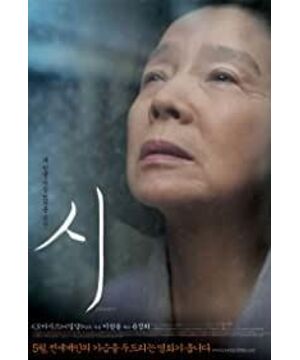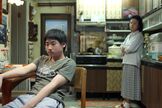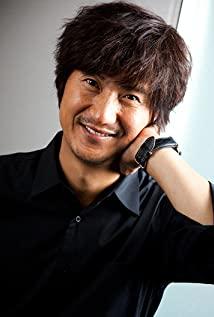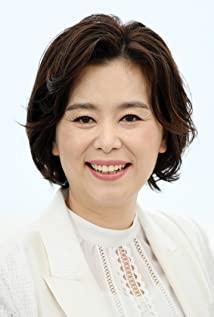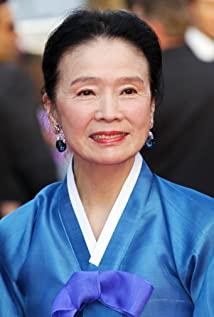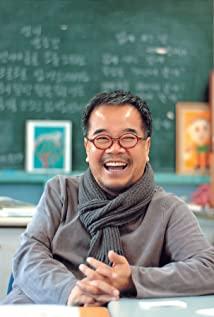The Taste of Poetry: Full of Strings and Unfinished Desires
Lee Chang-dong is destined not to make Poetry into a film called "Days and Nights in Tianshui Wai" that expresses the lives of Korean grandparents and grandchildren. A girl's body floated on the calm river. Park Ji-jin, a girl who couldn't bear the school's sexual violence, threw herself into the water. Meizi's grandson Zhongxu was one of the perpetrators. The six boys' parents formed a united front to try to get the school, the media and the victim's family to settle the matter with 30 million won in compensation. There are two main lines of the story: one is that Miko wants to write a poem at the end of her studies at the Cultural Institute, and the other is that she must raise 5 million won (about 30,000 yuan) in compensation to the victims' parents.
Infinite scenery is on the dangerous peak, Li Cangdong actually chose the first one as the main narrative line, so a lot of space is used in the film to show how Meizi finds inspiration, observes life, and takes a notebook to record the fragments of her thinking. She observes the color of the apples, the taste of the apples, she sits in the shade and listens to the leaves talking to her. She stood on the bridge and the wind blew her hat away. She was surprised at first, then felt the breeze blow her hair with relief, and a contented smile appeared on her face. The director's skill is best seen in the way of fiction and fiction. Although the rhythm of the story is gentle and the dramatic conflict is not obvious, the emotional tension is getting stronger and stronger, and the moral self-condemnation and economic embarrassment are almost overwhelming. Nervous, and the most unbearable thing for Miko is that the school sexual violence of six teenagers caused a girl to commit suicide by throwing herself into the river. This is a sin that money cannot cover up.
The surface of the film is light and shadowy, people live peacefully, children are playing hula hoops, but everything is too quiet, so quiet that people feel nervous. The teenagers could not escape the punishment of the law. Miko raised the compensation in a humiliating way, and her grandson was also taken away by the police. Did Miko expose it herself? There are many possible explanations for the just right blank space in the film. At the end of the film, the emotional tension is full, and Miko finally wrote a poem, the first and last poem in her life, called "The Song of St. Agnes", the song of St. Agnes. The story comes from Christian legends. She represents the will of loyalty and fearlessness of evil forces. Miko's voice appears as a voice-over, "How are you? Is it still so beautiful?... Can you receive the letter I didn't dare to send?" Can I express the repentance that I dare not admit? Time will pass, will the rose wither?"
Halfway through the poem, the voice of the young girl Park Ji-jin appeared, and the living and the dead sang together, reciting the same song poetry. The camera returns to the slowly flowing river, echoing the river at the beginning of the film, and the deep and distant artistic effect drifts away.
Turn a blind eye: more indifference than indifference
In the film, Miko suffers from Alzheimer's disease, and forgetfulness is an early symptom, but she has not forgotten the girl who committed suicide. She always endures the pain of ants eating the heart, but people seem to be more forgetful than Miko. Miko's rich emotions are naive and ridiculous in a generally indifferent society.
Turning a blind eye is a terrible emotion more indifferent than indifference. Meizi saw the mother of the girl who committed suicide at the door of the hospital. She talked with the daughter of the hemiplegic old man about it. The other party didn't respond. She was just busy at the cashier with a professional smile on her face. She went home and asked her grandson, who was so calm as if nothing had happened, staring at the TV and asking her grandmother for a new phone. When she knew that her beloved grandson was one of the rapists, she put the photo of the girl who committed suicide on the dining table, she pulled the quilt over her grandson's head, she wanted to know the truth, but the grandson never gave her any feedback, grandson Always indifferent as if nothing had happened. This kind of emotion is shocking. He and the other five boys raped a girl of the same grade in the school's science laboratory, causing the girl to commit suicide by throwing herself into the river. His only action was to call everyone at home to discuss countermeasures, and then calmly Go to school as usual, watch TV as usual, play football and games as usual. He knew that the girl was dead, and he knew that grandma knew. He saw the girl's portrait on the table. He was called by grandma to question him late at night, but he was still covered with the quilt and said nothing. He is still a minor, he cannot be so indifferent.
The behavior of the parents of the other boys was even more infuriating. They just want money to settle the matter, no one ever felt that their child committed a serious crime, and some even said that the girl was ugly and short, and it was voluntary. No one talks about punishment, the purpose of the meeting is to raise money. During the first discussion, Miko went out silently, looked at the cockscombs outside the window, and wrote the short phrase "Flowers as red as blood" for the first time when she knew that her grandson was a rapist.
In the next few discussions, the school teacher came and told everyone to keep it strictly confidential and sign the agreement as soon as possible. The reporter from the newspaper came and stopped asking about the details of Miko's case, but sat next to him and smiled, apparently being bought off by the parents. Finally, the mother of the girl who committed suicide also came. She was dressed in plain clothes. She could see that the family was not wealthy. She had a calm face.
The estrangement between the grandson and the grandmother is obvious. Will the daughter be the sustenance of Meizi's emotions? Miko has repeatedly emphasized that she and her daughter are good friends, but in fact, she did not tell her the truth. Daughters rarely pay their mothers alimony, are indifferent to their sons, do not visit their grandparents, and the contact between mother and daughter is limited to phone calls. Perhaps, the daughter is just dealing with her mother hypocritically. Miko is lonely at heart. She would rather keep a little vanity and show off to others that "my daughter and I are like friends", but she doesn't even have the courage to ask her daughter for compensation. Miko has been immersed in her own world. This world is not as cold as the outside world, but warm, full of light, warmth, flowers and love.
Plain and
harmonious: Kim Ki-duk, a Korean director who has filmed films such as "The Drifting Room" and "Empty Room", said: "Among Korean directors, if Lee Chang-dong ranks first and Kang Di-gyu ranks second, I deserve it. Ranked third." Li Cangdong only started making films at the age of 43, and only five films have been released so far. In 2007, his fourth work "Miryang" helped actress Jeon Do-yeon become the first Cannes actress in Korean history. And this "Poem" won Li Changdong the Best Screenplay Award at the 2010 Cannes Film Festival. Li Yinhe recommended "Poetry" to everyone on Weibo. "Although it lasted for more than two hours, I never got tired of it, and I was very nervous from beginning to end. It felt very sincere and heavy. All the details of the thinking about life, the perception of poetry, and the relationship between grandparents and grandchildren are very moving. Human nature The cruelty and beauty, indifference and warmth are all well expressed."
Li Cangdong is a typical writer and filmmaker. He has rich experience. Minister of Culture and Tourism of Korea. Li Cangdong has always paid attention to social ethics and morality with a calm and calm attitude. In an interview, he said: "When we have darkness, we can have light; when we have ugliness, we can have beauty. None of these things can exist independently, and we need contrast to create a sense of beauty. You You may think that I am showing a painful and cruel life, but in fact, I am showing the hope of life through this cruel performance."
Li Cangdong has deep roots in China. He came to Beijing in 1994 and planned to open a Korean restaurant on Xueyuan Road, one of the many universities in the university. His favorite director is Hou Hsiao-hsien. He was shocked when he watched "The Man from the Wind Cabinet" and wondered, "How could this director know my secret". From the gang feud in "Green Fish" to the reflection on history in "Mint"; from the sincere love in "Oasis", to the forgiveness and escape in "Miryang", and the self-salvation of "Poem" today. Each of Li Cangdong's films is written with deep humanistic feelings, revealing the power of the director's quiet image.
View more about Poetry reviews


